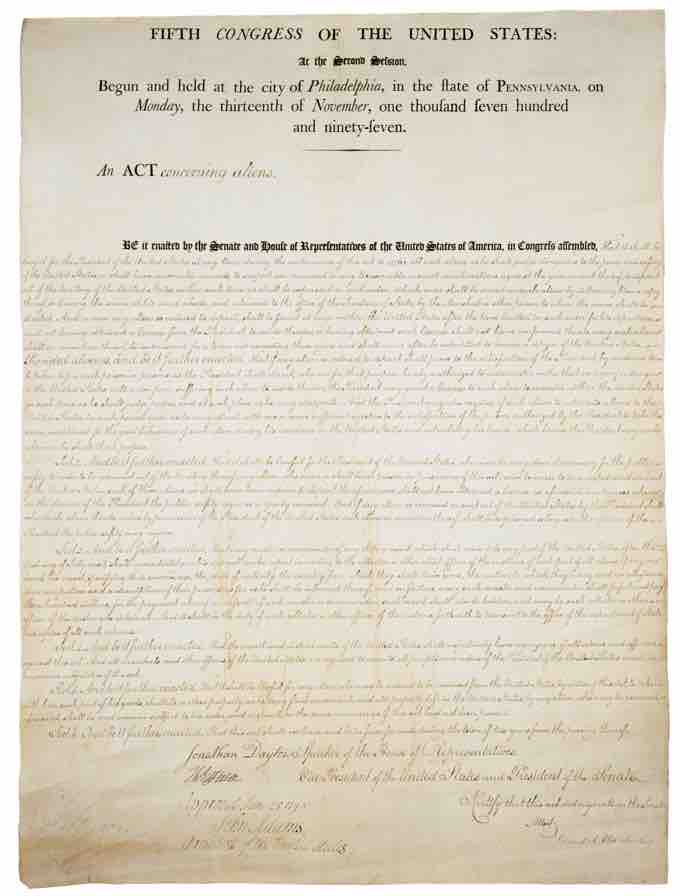Overview
The Alien and Sedition Acts were four bills passed in 1798 by the Federalists in the midst of the French Revolution and during the undeclared naval war with France, known as the Quasi-War. They were signed into law by President John Adams and were intended as a direct political attack on the Democratic-Republicans.
Background
The XYZ Affair and the Quasi-War incited Francophobic sentiment in the majority of the American public; however, Democratic-Republicans remained supportive on the French and outspoken critics of the Federalist administration, which they believed was unconstitutionally developing a tyrannical centralized government. The Federalists, on the other hand, were suspicious of the Democratic-Republican party's affinity for France. This suspicion was heightened when the dispatches of the XYZ Affair were released, and agent "Y" boasted of the existence of a "French" party in American politics. The Federalist-dominated Congress believed that Democratic-Republicans, fueled by the French and French-sympathizing immigrants, posed a subversive threat to the United States. The Alien and Sedition Acts were passed as a codified attempt by the Federalists to protect the United States from the anarchy of the French Revolution and from those seditious elements seeking to undermine the federal government.
The Laws
Four separate laws constituted the Alien and Sedition Acts:
- The Naturalization Act repealed and replaced the Naturalization Act of 1795 and extended the duration of residence required for aliens to become citizens of the United States from five years to fourteen years.
- The Alien Act authorized the president to deport any resident alien considered "dangerous to the peace and safety of the United States." It was activated June 25, 1798, with a two-year expiration date.
- The Alien Enemies Act authorized the president to apprehend and deport resident aliens if their home countries were at war with the United States. Enacted July 6, 1798, and providing no expiration provision, the act remains intact today as Title 50 of U.S. Code.
- The Sedition Act made it a crime to publish "false, scandalous, and malicious writing" against the government or certain officials. It was enacted July 14, 1798, with an expiration date of March 3, 1801
Prosecutions and Resistance
Republican editors, Representative Matthew Lyon, and private individuals were targets of prosecution under the Sedition Act. Twenty-five people were arrested; of these, eleven were tried, one died awaiting trial, and ten were convicted of sedition, often in trials before openly partisan Federalist judges.
Many of those convicted under the Sedition Act were pardoned by President Jefferson after the election of 1800. The most controversial arrest made under the Alien and Sedition Acts was of a member of Congress. Matthew Lyon, an Irish-born former indentured servant who had purchased his own freedom and fought in the American Revolution, was a Democratic-Republican congressman from Vermont jailed under the Sedition Act for his anti-Federalist writings. Lyon accused the administration of "ridiculous pomp, foolish adulation, and selfish avarice," and claimed that Adams had "a continual grasp for power." While in prison, Lyon continued to write against the administration and conducted his successful reelection campaign from jail. Democratic-Republicans across the country united in support of Lyon, paying his legal fees and penal fines. Eventually acquitted, Lyon returned to Congress after his release.
Legacy of the Alien and Sedition Acts
The Alien and Sedition Acts were never appealed to the Supreme Court, which in the 1790s was composed entirely of Federalists who were openly hostile to their political opponents. However, the Democratic-Republicans mobilized against the Acts as part of their campaign strategy in the 1800 election, and they experienced success as most Federalists were voted out of office. Thomas Jefferson, upon assuming the presidency, pardoned all of those still serving sentences under the Sedition Act, and in 1802, the House Judiciary Committee denounced the Sedition Act as unconstitutional and authorized the refund of penal fines that victims had paid.
Jefferson and James Madison also secretly drafted the Kentucky and Virginia Resolutions denouncing the Alien and Sedition Acts, and Jefferson even advocated nullification and state secession as a legitimate response to this tyrannical imposition by the federal government. Long after the collapse of the Federalist party, the Virginia and Kentucky resolutions remained an inspiration for states' rights advocates and were used as models in drafting the declarations of secession by Southern states on the eve of the Civil War.
While the Alien and Sedition Acts were left largely unenforced after 1800, the Alien Act was later used to justify the internment of Japanese Americans during World War II, and the Supreme Court was grappling with the constitutionality of the Sedition Acts as late as the 1960s.

The Alien and Sedition Acts (1798)
This image shows the text of the "Alien Friends Act."